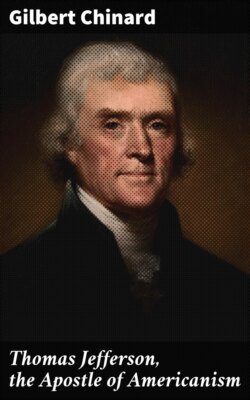Читать книгу Thomas Jefferson, the Apostle of Americanism - Gilbert Chinard - Страница 21
На сайте Литреса книга снята с продажи.
THE REVISION OF THE LAWS OF VIRGINIA
ОглавлениеTable of Contents
At the meeting of July 4, 1776, Congress, after adopting the Declaration of Independence,
"Resolved, That Dr. Franklin, Mr. J. Adams and Mr. Jefferson, be a committee, to bring in a device for a seal for the United States of America."[54]
Among the several suggestions made in the committee, the one proposed by Jefferson, according to John Adams, deserves particular attention: "Mr. Jefferson proposed, the children of Israel in the wilderness led by a cloud by day, and a pillar by night—and on the other side, Hengist and Horsa, the Saxon chiefs, from whom we claim the honor of being descended, and whose political principles and form of government we have assumed."
None of the suggestions made by the committee, or their final report, was ever adopted, but the device proposed by Jefferson is a significant indication that his thoughts were still running in the same channel. "The children of Israel" would remind one of the favorite contention of the settlers, piously preserved by their descendants to this day, that they were a chosen people; but the other side of the seal reminds one that Jefferson's great ambition at that time was to promote a renaissance of Anglo-Saxon primitive institutions on the new continent. Thus presented, the American Revolution was nothing but the reclamation of the Anglo-Saxon birthright of which the colonists had been deprived by "a long trend of abuses." Nor does it appear that there was anything in this theory which surprised or shocked his contemporaries; Adams apparently did not disapprove of it, and it would be easy to bring in many similar expressions of the same idea in documents of the time.
The principle once established, there remained to put it into effect, and to make a beginning in Virginia. This was the thought uppermost in Jefferson's mind when he went back to the Old Dominion. "Are we not the better for what we have hitherto abolished of the feudal system," he wrote to Edmund Pendleton. "Has not every restitution of the ancient Saxon laws had happy effects? Is it not better now that we return at once into that happy system of our ancestors, the wisest and most perfect ever yet devised by the wit of man, as it stood before the 8th century?"[55] This is the true foundation of Jefferson's political philosophy. No greater mistake could be made than to look for his sources in Locke, Montesquieu, or Rousseau. The Jeffersonian democracy was born under the sign of Hengist and Horsa, not of the Goddess Reason.
On September 26, 1776, Congress proceeded to the election of commissioners to the Court of France, and the ballots being taken, Mr. Benjamin Franklin, Mr. Silas Deane, and Mr. Thomas Jefferson were chosen. This was a signal recognition of the prestige of the young author of the Declaration of Independence. An express was sent at once to Jefferson to inform him of his appointment. For the first time he was offered an opportunity to visit the Old World. His desire to go was so strong that he remained undecided for three days before he made up his mind to decline the nomination and to send his refusal to Hancock. In the letter he then wrote, he alleged that "circumstances very peculiar in the situation of my family, such as neither permit me to leave nor to carry it compel me to ask leave to decline a service so honorable and at the same time so important to the American cause."[56] His biographer Randall observes on this occasion that "the private causes" were the precarious situation of his wife's health. The family record contains the following entry: "a son born May 28th, 1777, 10 h. p.m."[57] The true reason, however, is to be found in the "Autobiography", as given before.
The very day Jefferson answered Hancock, he was put on several committees, and the next day he obtained leave to bring in a bill "To enable tenants in taille to convey their land in fee simple." The Bill to Abolish Entails was reported on October 14, and after discussion and amendments passed by the House on October 23, and approved by the Senate on November first.
The bill was no improvisation and Jefferson intended by it "to strike at the very root of feudalism in Virginia." On August 13, 1776, he had already written to an anonymous correspondent, probably Edmund Pendleton:
